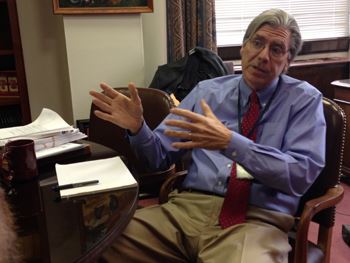|
Despite Highs And Lows, USDA’s Chief Economist Aimed For Objectivity
SARA WYANT AND SPENCER CHASE
Washington, D.C.
Commodity prices can cycle up and then down again. Agriculture secretaries can come and go. But the one constant over the last couple of decades has been a man watching the markets and overseeing independent and accurate analysis from his chair within USDA.
Chief Economist Joe Glauber stepped down at the end of December, ending a distinguished career in all things important to the agricultural economy.
The tall, athletic Glauber has been with the Office of the Chief Economist (OCE) for most of the last 22 years – often pedaling his bicycle several miles to work and back each day. He was Deputy Chief Economist from 1992-2007, when he left the office to briefly work with the office of the U.S. Trade Representative, serving as a Special Doha Agricultural Envoy. After 15 years as deputy, he assumed the role of Chief Economist after Keith Collins retired from the job in 2007.
“(It was) a good run; I can’t complain,” Glauber said in an interview with Agri-Pulse.

Glauber, shown here in his USDA office, retired Dec. 31 after seven years as the agency’s Chief Economist.
He spent most of the last 22 years working in the Office of Chief Economist.
Photo courtesy Agri-Pulse
“I thought ‘Well, I can stay for another five to 10 years, but I want to do some other things.’”
Those “other things” involve taking a more in-depth look at a smaller scope of issues, which he plans on doing in his job as a visiting senior research fellow at the International Food Policy Research Institute (IFPRI). Glauber starts with IFPRI this month. During his time as the Chief Economist, Glauber oversaw USDA efforts in a wide variety of subjects, but now he’ll be able to focus on areas including food security, the futures markets and trade.
Glauber advised both Democrat and Republican secretaries of agriculture, who might not have always agreed with his reports. But they always knew that Glauber and his team of economists had done their homework and always strived to provide an honest, accurate assessment.
And that’s one reason why Agriculture Secretary Tom Vilsack noted that Glauber will be missed.
“I’ve told him privately and publicly…..I don’t think anybody has a higher level of credibility than Joe Glauber,” Vilsack emphasized.
Glauber, who holds a Ph.D. in agricultural economics from the University of Wisconsin, said he always kept two principles in mind during his time with OCE: objectivity and accuracy. He said the reports and testimonies that came from his office had the potential to have significant market effects, so presenting dependable information was -- and still is -- critical for his office.
Glauber was on staff during some of the most drastic upticks in commodity prices in recent memory in the mid- to late-2000s and the summer of 2012, when corn peaked near $8.50 per bushel. Exports have also increased during his tenure as Chief and Deputy Chief. These and other developments have made the agricultural industry and economy almost unrecognizable from what they looked like 22 years ago.
“Look at the scale of exports; look at the scale of assets,” Glauber said. “All those have increased so much over the last five, 10 years. It is a very different sector than it was.”
Glauber said his years with OCE have been busy ones, as they involved the passage and implementation of four farm bills and across-the-board budget cuts in the form of sequestration.
Despite ongoing pressures to reduce the federal deficit and agency budgets, Glauber is hopeful that congressional appropriators and budget officials will recognize the value of the work done in his office at the corner of USDA’s first floor headquarters.
“You get back to the creation of USDA, providing public information is one of the big things they did initially. We’ve been running an outlook conference since 1923, we’ve been providing situation and outlook reports in one form or another dating back to about that time as well,” Glauber said, adding again for good measure that he feels “very strongly” about the need for objectivity in that information. “So that’s a real public good that is very, very easy in my mind to justify, but sometimes it may be harder to try to make that case to appropriators.”
Looking forward, Glauber points to the role that precision agriculture will play in not only production agriculture and in the overall farm economy. He said there’s potential for improved market information from the technology such as more expedient results on crop progression, regional weather patterns, and better information for grain marketers.
Robert Johansson, the current Deputy Chief Economist, will take over as acting Chief Economist in the New Year, and Glauber said he would be a “great candidate” to become his permanent replacement.
Glauber said he’ll miss things like speaking at the annual Agricultural Outlook Forum and working with the markets on a day-to-day basis, where he is considered an expert on such a wide variety of topics.
“You really do feel that this job matters,” Glauber said. “People ask your opinion, they expect you to have the answer, so there is that sort of edge that this job brings, which is really important and you want to do the right thing. You want to have the right information. You don’t want to let someone down by not having a complete answer, and that’s tough. It’s a big challenge.”
And like any market, every year brings a different set of surprises.
“I’ve been in this job since 1992 and every year has been different in terms of what issues are big and what is important,” Glauber emphasized. “I enjoyed it. I know that there are a lot of things I’ll miss here.” ∆
SARA WYANT: Editor of Agri-Pulse, a weekly e-newsletter covering farm and rural policy. To contact her, go to: http://www.agri-pulse.com/
SPENCER CHASE: Co-writer on this article with Sara Wyant at AgriPulse.
|
|